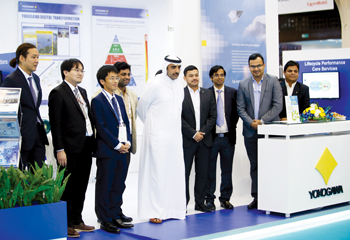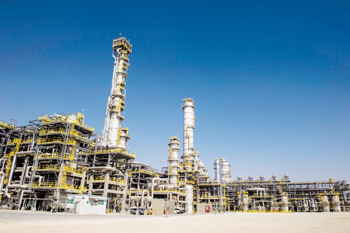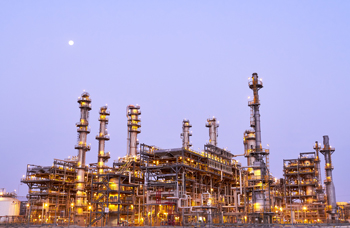
 Bahrain Oil Minister Shaikh Mohammed bin Khalifa Al Khalifa at Yokogawa’s stand at Mepec
Bahrain Oil Minister Shaikh Mohammed bin Khalifa Al Khalifa at Yokogawa’s stand at Mepec
The commencement of Industrial Revolution 4.0 is a huge enabler for the industry as a whole, senior Yokogawa officials tell SREE BHAT
Digitalisation is a huge enabler for the oil and gas (O&G) industry and new technological solutions have the ability to increase efficiency and effect major cost savings in the industry, according to two senior executives of Yokogawa, a leading provider of industrial automation and test and measurement solutions.
Speaking to OGN on the sidelines of the Middle East Process Engineering Conference & Exhibition (Mepec) in Bahrain, Ahmad Al-Abdrabbuh, senior executive vice president, Yokogawa Saudi Arabia Company; and Pierre E De Vuyst, senior executive vice president, Yokogawa Middle East & Africa, said every player in the market is facing the challenge of cost reduction. Digitalisation is the big buzz word now and everybody has big hope for that.
'If you don’t use the tools available in the market, you will lose competitive advantage. Those companies that will not embrace the future will become obsolete one day,' they said.
Excerpts from the interview:
What are the key challenges that the process engineering industry is facing today?
Al-Abdrabbuh: The oil and gas price decline is reflected in the size of business and the type of challenges we have in the industry. That’s a reality that everybody must deal with, not only to survive, but also to turn this challenge into an opportunity. And that is possible.
 |
|
De Vuyst and Al-Abdrabbuh |
Another major challenge is the rapid change in technology. The commencement of Industrial Revolution 4.0 is a huge enabler for the industry as a whole – just like the other three industrial revolutions. Nevertheless, that doesn’t come without the challenges including the human resource retraining or redevelopment and the plan for transformation to take advantage of the technology.
These can be looked at as challenges or opportunities, depending on each player on how he will deal with them and prepare for them.
De Vuyst: The biggest challenge now is the relatively low level of activity in the market. The size of the market has come down drastically and companies are trying to save money big time and there is cost reduction everywhere. We need to be very creative in offering new technologies and solutions to customers so they can improve their operations and reduce costs. We need to bring in all kinds of new ideas, new technologies. Digitalisation is the big buzz word now and everybody has big hope for that. We need to demonstrate that it lives up to its promise.
Are clients willing to invest in Digitalisation with the market on the decline?
De Vuyst: Companies are willing to invest if we can demonstrate that it will reduce overall operating costs to them. They will want very clear business plans that demonstrate cost savings. They won’t invest just for the sake of digitalisation.
Al-Abdrabbuh: Any investment is based on return. It varies from one company or one operation to another and depends on how long they are willing to invest for and how the client’s outlook for the future is. Some are near-sighted and some are really far-sighted. But again, the bottom line is the profit it can add and how long it will take to get return on this investment. Sweating the investment is a big important thing in enhancing ROI.
What are the latest trends and technologies that you see in the industry and how is Yokogawa bracing itself to meet the needs of the time?
Al-Abdrabbuh: Yokogawa started the mid-term business plan called Transformation 2017 in 2015. Up to 2017 we worked on the foundation for the transformation into digitalisation stage – moving from a manufacturer and a system integrator to a solutions provider and a partner that would co-innovate with our customers to add value. In order to do that we undertook several initiatives, including mergers, acquisitions, etc. to enhance our breadth and depth in process industry and process technology. We recently acquired KBC Advanced Technologies, which is an engineering consultancy renowned in the process industry, energy management and process simulation.
We also acquired a company called Industrial Evolution which specialises in Data-as-a-service (DaaS) for the process industry and also provides cloud-based technology that is trusted by the major oil and gas players. So we are now gearing to be the enabler of the next Industrial Revolution and our main target is to create value for our customers.
How much cost saving will these technologies bring about? Is it enough to cushion the oil decline?
Al-Abdrabbuh: It depends on where you deploy the technology and how it is deployed. It’s very hard to quantify. On the flip side, if you don’t use the tools available in the market, you will lose competitive advantage. Those companies that will not embrace the future will become obsolete one day. So eventually, these technologies will become a mission critical element. It’s not a matter of luxury or just enhancements.
Yokogawa has a strong presence in the region. Tell us about your plans for the regional market and business growth.
De Vuyst: Of course we all plan to grow, but the market is not really helping with the oil and gas downturn. All customers are trying to reduce expenditures. We don’t have many mega projects like we had before. So at the moment it is a bit difficult to really grow with the existing projects. However, Yokogawa is working with customers to improve their productivity, safety and energy performance despite the downturn.
A lot of things are happening quietly. The cost-cutting measures by the oil industry; the new environment laws; and the development of other industries, such as mining, provide opportunities to offer additional services to them. And then, of course, there is the adoption of new technologies to reduce operating costs. These do not translate into huge numbers but it is business that is growing slowly. Population in the region is increasing, so will still have a lot of opportunities to grow in the water and power generation sectors, where we are quite active.
Other opportunities are coming up in new industries such as sugar refinery, terminals management, edible oil terminal, etc. We are also extending our activities outside of the Gulf into Africa from here.
So I think in terms of overall numbers it may be a little quiet for the next couple of years, but we see a lot of projects in the pipeline.
Al-Abdrabbuh: In Saudi Arabia, we are exploring the opportunities opened up by the new Saudi Vision 2030, and National Transformation Plan (NTP) 2020 and are aligning our prospects in support of that vision, be it in human resource development, research and development or investment for growth based on the business opportunities that will be introduced. We are confident that we will be able to play an important role that will reflect positively on us as well as equally on society. There are a lot of challenges. We work very hard and we are good in turning challenges into opportunities to add value to our customers.
Please tell us about your participation in Mepec 2017 and how important is the event for you?
Al-Abdrabbuh: We have been supporting Mepec since the first edition and are part of the organising committee. We share knowledge, showcase our technology, products and solutions that we think will add value to the society and the region.
This year at Mepec, we contributed to different activities, including: Speed mentoring camp for the youth, discussion panels; and presentation of technical papers.
It’s amazing to see how the event has grown in stature over such a short time. We are only in the fourth edition, but it already feels like the hundredth in terms of maturity, participation and the richness of the content and the knowledge that we all as exhibitors, delegates, presenters are able to share. We also see the presence of major players and key stakeholders at the event.
This is the forum to synergise, to collaborate, to work together, to face the challenges and grab the opportunity ahead of the wave.























































































